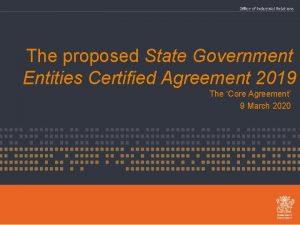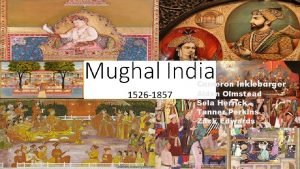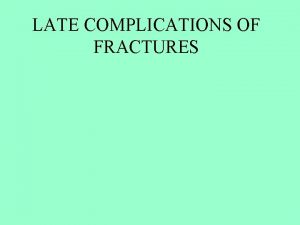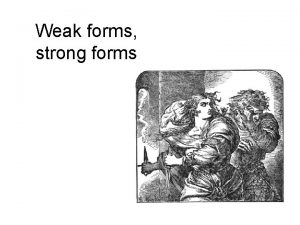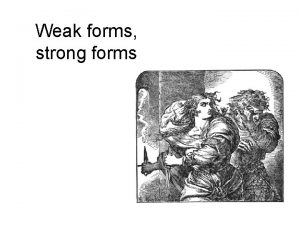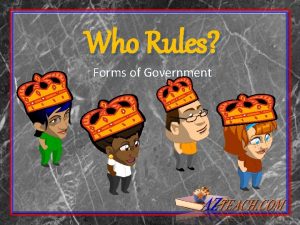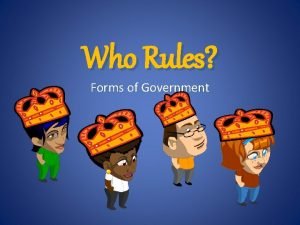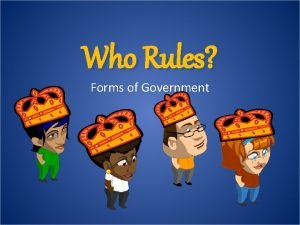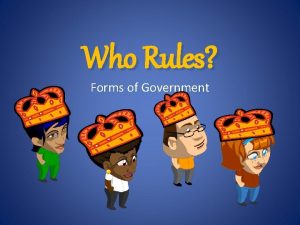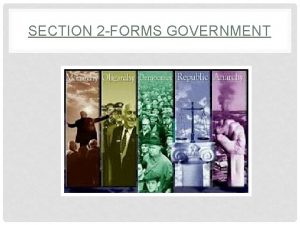Forms of Government Mr Perkins Fall 2015 Forms














- Slides: 14

Forms of Government Mr. Perkins Fall 2015

Forms of Government Objective: Compare the govt. of the U. S. with other governmental systems (monarchy, limited monarchy, oligarchy, dictatorship, theocracy, and pure democracy) Essential Question: Why do people create, structure, and change governments?

Glossary Terms 1. 2. 3. 4. 5. 6. 7. 8. 9. public policy representative democracy constitutional monarchy majority rule authoritarian regime totalitarian ideology socialism resolve

Group Activity • Move into the groups I place you in quickly and quietly! • You will be assigned one of the Types of Government – – – – Absolute monarchy Limited monarchy (constitutional monarchy) Oligarchy Authoritarianism (authoritarian regimes) Totalitarianism (socialism) (ideology) Theocracy Pure democracy (majority rule) (representative democracy) • As a group, perform a skit that demonstrates how your type of government runs. Make sure to add an explanation of the definition in parentheses in your skit. Use your books and your phones to research what your type of government is.

Bellringer – 9/2/15 • What type of government does the United States have? • What is socialism? • Who does a king receive his power from?

Types of Government 1. Democratic Government – Began in Athens Greece • Pure Democracy: all citizens met to discuss govt. matters and voted. – Representative democracy: citizen choose a group of people to represent them, make laws, • Republics: citizens have a role in choosing the head of govt. • Constitutional monarchy: Hereditary ruler with limited power (ceremonial) – Voter elect representatives to a lawmaking body – Representatives choose a prime minister to head govt. – Democracy works on the principle of majority rule—more than half

Types of Government 2. Authoritarian Govt. Power is held by a person or group not accountable to the people. A. Absolute monarchy (autocracy): Monarchs ruled as they wished with unlimited power. • B. • • Modern absolute monarch: King of Saudi Arabia Dictatorship: dictators have complete control. Come to power often by force Rely on police and military to remain in power. People do not have freedoms Modern dictatorships: North Korea, Turkmenistan https: //www. youtube. com/watch? v=TZNQDx. BCC 20

Types of Government C. Totalitarian rule: Govt. controls all aspects of people’s lives • Ideology: strict idea about life and society • Socialism: society (govt. ) controls all aspects of the economy • Infamous totalitarian regimes: Nazi Germany/Hitler, Fascist Italy/Mussolini, Soviet Union/Stalin • Modern totalitarian nations: Cuba, North Korea

Types of Government D. Oligarchies: form of govt. in which a small group of people hold power. E. Theocracies: govt. ruled by religious leaders. • Religious law is the basis of society’s law.

Systems of Governments – Federal system: power is divided (United States) • Germany, Brazil and India have federal systems – Unitary systems: central govt. is supreme • Central govt. creates smaller units to carry out some of its functions • France, Japan and Great Britain have unitary govt. – Confederal system: states have agreed to join together to create a common body but states retain power. Example —the United States after it gained independence.

The Importance of Governments • Keep order and provide security o Provide laws, or rules of conduct o Law help resolve, or find a solution, for conflicts. • Provide services o Libraries, schools, hospitals, parks o Build and repair streets and bridges o Collect garbage o Deliver mail • Guide the community o Develops public policy (decisions and actions a govt. takes to solve problems) o Involves financial planning o Handles relations with other countries.

Levels of Government – Federal • Makes and enforces laws for the entire country • Sets rules for citizenship

Levels of Government – State • Laws cannot go against the federal govt. • Decides matters for the people of their state • Marriage laws, make rules for schooling, and hold elections. • Manage public health and safety, build roads/bridges.

Levels of Government – Local • Level of govt. closest to the citizens • Cannot take actions that go against federal govt. • Provide schools, police, fire, emergency, medical, services • Local courts • Public services—outdoor lighting, removing snow, parade clean-up.
 State government entities certified agreement 2020
State government entities certified agreement 2020 Bag lunch by dillard perkins
Bag lunch by dillard perkins Cte funding texas
Cte funding texas Perkins formula fracture healing
Perkins formula fracture healing Perkins 4008-30tag2 technical data
Perkins 4008-30tag2 technical data Lars perkins
Lars perkins Tanner perkins
Tanner perkins Rachel perkins clinical psychologist
Rachel perkins clinical psychologist Charles perkins and the freedom rides
Charles perkins and the freedom rides Dorothy perkins stockists
Dorothy perkins stockists Perkins timetable fracture healing
Perkins timetable fracture healing Chris perkins physio
Chris perkins physio 4 r's of fracture management
4 r's of fracture management Cde perkins
Cde perkins Bag lunch by dillard perkins
Bag lunch by dillard perkins
